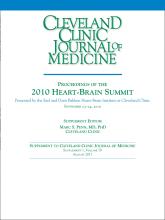ABSTRACT
Previous research has demonstrated an association between depression and incident coronary heart disease (CHD); in 2010, well-controlled studies and meta-analyses went beyond depression to include anxiety, anger expression, and negative affect as predictors of incident CHD. Emerging research suggests that positive emotions and resilience (including the ability to self-regulate) offer protection against CHD. New research is elucidating the pathophysiology to explain the effects of emotion and resilience on disease risk; for example, recent work has begun to consider how the relaxation response promotes resilience and found that it induces genomic changes that counter oxidative stress and associated cellular damage.
Footnotes
Dr. Kubzansky reported that she has no financial relationships that pose a potential conflict of interest with this article.
- © 2011 The Cleveland Clinic Foundation. All Rights Reserved






